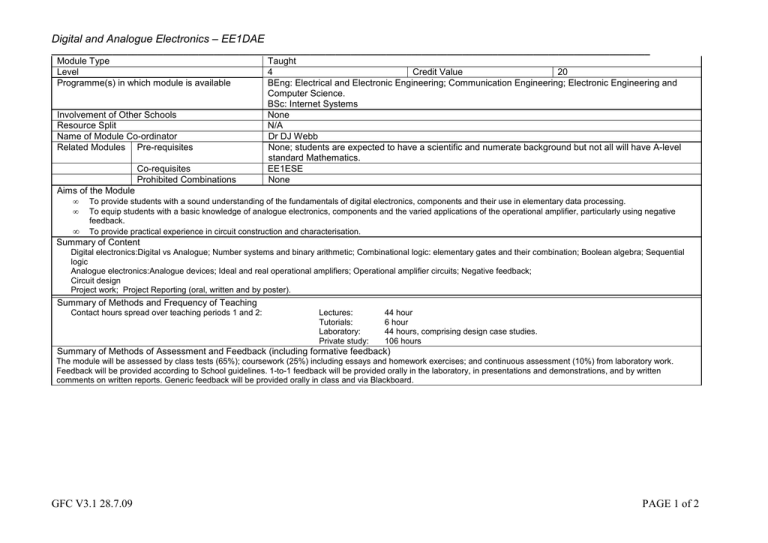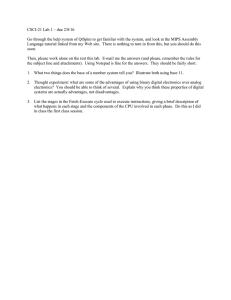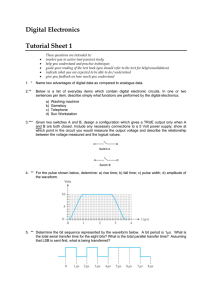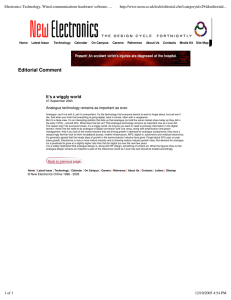EE1DAE - digital and analogue electronics
advertisement

Digital and Analogue Electronics – EE1DAE ______________________________________________________________________________________________________________________ Module Type Taught Level 4 Credit Value 20 Programme(s) in which module is available BEng: Electrical and Electronic Engineering; Communication Engineering; Electronic Engineering and Computer Science. BSc: Internet Systems Involvement of Other Schools None Resource Split N/A Name of Module Co-ordinator Dr DJ Webb Related Modules Pre-requisites None; students are expected to have a scientific and numerate background but not all will have A-level standard Mathematics. Co-requisites EE1ESE Prohibited Combinations None Aims of the Module • • To provide students with a sound understanding of the fundamentals of digital electronics, components and their use in elementary data processing. To equip students with a basic knowledge of analogue electronics, components and the varied applications of the operational amplifier, particularly using negative feedback. To provide practical experience in circuit construction and characterisation. • Summary of Content Digital electronics:Digital vs Analogue; Number systems and binary arithmetic; Combinational logic: elementary gates and their combination; Boolean algebra; Sequential logic Analogue electronics:Analogue devices; Ideal and real operational amplifiers; Operational amplifier circuits; Negative feedback; Circuit design Project work; Project Reporting (oral, written and by poster). Summary of Methods and Frequency of Teaching Contact hours spread over teaching periods 1 and 2: Lectures: Tutorials: Laboratory: Private study: 44 hour 6 hour 44 hours, comprising design case studies. 106 hours Summary of Methods of Assessment and Feedback (including formative feedback) The module will be assessed by class tests (65%); coursework (25%) including essays and homework exercises; and continuous assessment (10%) from laboratory work. Feedback will be provided according to School guidelines. 1-to-1 feedback will be provided orally in the laboratory, in presentations and demonstrations, and by written comments on written reports. Generic feedback will be provided orally in class and via Blackboard. GFC V3.1 28.7.09 PAGE 1 of 2 Digital and Analogue Electronics – EE1DAE Module Outcomes – what the student should gain from successful completion of the module: Learning and Teaching and Assessment Strategies to enable outcomes to be achieved and demonstrated Learning and Teaching Assessment Methods Methods Knowledge and Understanding of • • • The fundamental concepts of digital and analogue electronics. The ability to design simple digital and analogue circuits. Some basic electronic components. Lectures, recommended reading, laboratory exercises, design case studies, tutorial problems, simulation Examination and design exercises Lectures, laboratory exercises, design case studies, tutorial problems, recommended reading, simulation Examination and design exercises Laboratory exercises, design case studies, tutorial problems Design exercises, laboratory reports and examination Lectures, laboratory exercises, design case studies, tutorial problems Design case studies, examination and laboratory reports Intellectual Skills • • • • Encode information in a variety of digital formats. Analyse and solve digital electronics problems. Circuit analysis. Plan, conduct, evaluate and report on a series of laboratory experiments. Professional/Subject Specific Skills • • • • • Plan and conduct digital and analogue electronics experiments. Use appropriate test and measurement equipment. Prepare a technical report. Circuit analysis Executing and reporting on an experimental investigation. Transferable Skills • • • • Problem solving analytical skills. Self-study. Management of time and resources. Report writing. Introductory Learning Resources Module information, tutorial material and generic feedback will be available on Blackboard in EE_CORE Core Texts Practical Electronics for Inventors, Paul Scherz, McGraw Hill, 2 Ed. Reading Lists Starting Electronics by Keith Brindley, Mastering Communication by Nicki Stanton Specification completed by: Date David Webb, revised Geof Carpenter 28.7.09 Date module approved by Teaching Committee(s) Original version June 2007 GFC V3.1 28.7.09 PAGE 2 of 2



